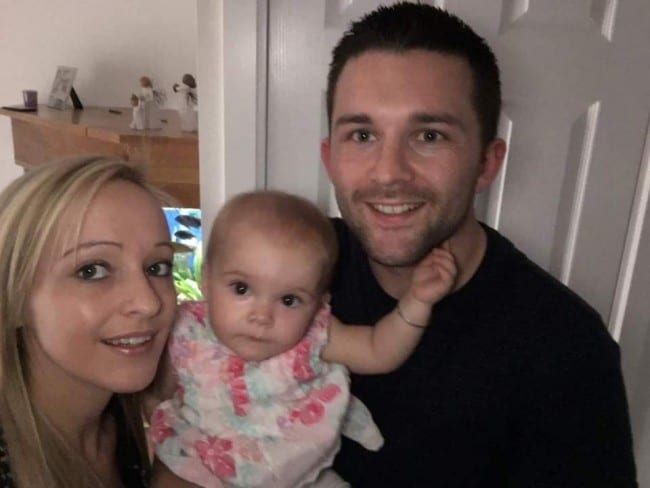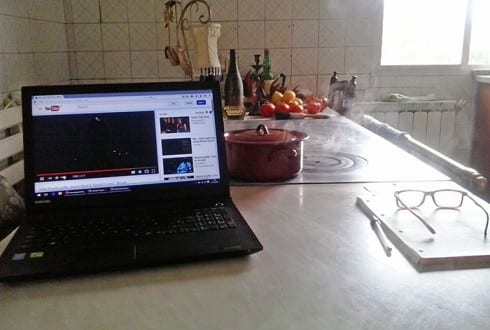
A BRITISH family’s holiday to Spain turned into a nightmare when their 11-month-old daughter was rushed to hospital with hand, foot and mouth disease.
Lily Connor and her father Lee Connor, 27, have undergone treatment in Menorca following an outbreak of the disease at the four-star Family Life Mar de Menorca resort.
The disease sees victims break out in sores and is passed on through direct contact with unwashed hands or surfaces contaminated with faeces.
The family, from Solihull in Birmingham, had flown to the island last month to enjoy their last possible break ahead of mother Emma’s due date.

Emma, 27, who was 11 weeks pregnant with their second child, said the staff ‘downplayed’ the outbreak after husband Lee expressed concerns about his baby and pregnant wife staying in the hotel.
Mum Emma said within two days of arriving on September 14, the hotel had put signs up warning of the outbreak, but made no efforts to move people to other hotels despite many becoming infected.
Baby Lily was so ill by the fourth day that doctors referred her to a hospital where she was treated for eight hours.
Mrs Connor said: “It was our last holiday before we have our new child.
“The first few days Lily was fine and then the second day we were there we were told Thomson put the notice up.

“My other half asked if it would be a problem because of me being pregnant and having a baby with us.
“They said it was fine.
“We expected them to move us elsewhere under the circumstances.
“By day four she was really not herself, she had a high temperature was falling asleep where ever she was and wouldn’t eat or drink, it was terrifying.
“We took her to the doctors on site and they sent her straight to the hospital.
“They thought it was because she fell over the day before but I knew it wasn’t, you can tell when your child really isn’t well.”
She added: “We were then in a room for eight hours, in the end I made the decision to discharge her.
“I decided that if we discharged her we could look after her in the hotel and make sure she was trying to eat and drink.
“We felt so guilty all holiday that we were putting Lily through it.
“We felt helpless, we had never seen her like that before.
“We were constantly cleaning her hands and worrying.
“Nevertheless she got it anyway, so did her dad.”
A spokesman for Thomson said: “We were made aware of a small number of cases of the Hand, Foot and Mouth virus at the Family Life Mar de Menorca hotel. Our resort team were fully briefed to assist guests and proactively displayed information on how to spot and prevent the spread of the illness.
“We would like to reassure our customers that their health is our number one priority, and Thomson closely audit all resorts to which we operate to ensure that hygiene and comfort levels are maintained in line with industry standards.”
Click here to read more News from The Olive Press.









Thomson should have said “We would like to reassure our customers that” after profits, “health is our number one priority…,”
Anyone else ever heard of this “disease”? No doubt they got something, but what? Really?
From the NHS Choices web site:
Hand, foot and mouth disease is a common infection that causes mouth ulcers and spots on the hands and feet.
It’s most common in young children – particularly those under 10 – but can affect older children and adults as well.
Hand, foot and mouth disease can be unpleasant, but it will usually clear up by itself within 7 to 10 days. You can normally look after yourself or your child at home.
The infection is not related to foot and mouth disease, which affects cattle, sheep and pigs.
Symptoms of hand, foot and mouth disease
The symptoms of hand, foot and mouth disease usually develop between three and five days after being exposed to the infection.
The first symptoms may include:
A high temperature (fever), usually around 38-39C (100.4-102.2F)
A general sense of feeling unwell
Loss of appetite
Coughing
Abdominal (tummy) pain
A sore throat and mouth
What to do if you or your child has hand, foot and mouth disease
If you have hand, foot and mouth disease, the best thing to do is to stay at home until you’re feeling better. There’s no cure for it, so you have to let it run its course.
To help ease your or your child’s symptoms:
Drink plenty of fluids to avoid dehydration – water or milk are ideal; it may help to give a baby smaller but more frequent bottle or breast milk feeds
Eat soft foods such as mashed potatoes, yoghurt and soups if eating and swallowing is uncomfortable – avoid hot, acidic or spicy foods and drinks
Take over-the-counter painkillers, such as paracetamol or ibuprofen, to ease a sore throat and fever – aspirin shouldn’t be given to children under the age of 16; paracetamol is best if you’re pregnant
Try gargling with warm, salty water to relieve discomfort from mouth ulcers – it’s important not to swallow the mixture, so this isn’t recommended for young children
Alternatively, use mouth gels, rinses or sprays for mouth ulcers – these are available from pharmacies, but aren’t routinely recommended, and some aren’t suitable for young children; ask your pharmacist for advice and make sure you read the instructions first
You should keep your child away from nursery or school until they’re feeling better. Adults with the condition should stay away from work until they’re feeling better.
When to get medical advice
You don’t usually need medical attention if you think you or your child has hand, foot and mouth disease. The infection will usually pass in 7 to 10 days, and there isn’t much your doctor can do.
Antibiotics won’t help as hand, foot and mouth disease is caused by a virus.
If you’re unsure whether you or your child has hand, foot and mouth disease, you can call NHS 111 or your GP for advice.
You should also get medical advice if:
Your child is unable or unwilling to drink any fluids
Your child has signs of dehydration, such as unresponsiveness, passing small amounts of urine or no urine at all, or cold hands and feet
Your child develops fits (seizures), confusion, weakness or a loss of consciousness
Your child is under three months old and has a temperature of 38C (101F) or above, or is between three and six months old and has a temperature of 39C (102F) or above
The skin becomes very painful, red, swollen and hot, or there’s a discharge of pus
The symptoms are getting worse or haven’t improved after 7 to 10 days
Get advice from your GP if you’re pregnant and you become infected within a few weeks of your due date. Infection in pregnancy is usually nothing to worry about, but there’s a small chance it could make your baby ill if you’re infected shortly before you give birth.
How hand, foot and mouth disease spreads
Someone with hand, foot and mouth disease is most infectious from just before their symptoms start until they’re feeling better.
The infection can be spread by close person to person contact and contact with contaminated surfaces. The virus is found in:
The droplets in the coughs and sneezes of an infected person – you can become infected if you get these on your hands and then touch your mouth, or if you breathe in the droplets
An infected person’s poo –if an infected person doesn’t wash their hands properly after going to the toilet, they can contaminate food or surfaces
An infected person’s saliva or fluid from their blisters – you can become infected if this gets in your mouth
The infection is caused by a number of different viruses, so it’s possible to get it more than once. Most people develop immunity to these viruses as they get older.
Preventing hand, foot and mouth disease
It’s not always possible to avoid getting hand, foot and mouth disease, but following the advice below can help stop the infection spreading.
Stay off work, school or nursery until you or your child are feeling better – there’s usually no need to wait until the last blister has healed, provided you’re otherwise well.
Use tissues to cover your mouth and nose when you cough or sneeze and put used tissues in a bin as soon as possible.
Wash your hands with soap and water often – particularly after going to the toilet, coughing, sneezing or handling nappies, and before preparing food.
Avoid sharing cups, utensils, towels and clothes with people who are infected.
Disinfect any surfaces or objects that could be contaminated – it’s best to use a bleach-based household cleaner.
Wash any bedding or clothing that could have become contaminated separately on a hot wash.
Coxsackievirus, named after the town where it was isolated, is one of the non-polio entero viruses. In tropical locations complications such as viral meningitus or encephalitus can develop, though this is rare. As web manager Karl Smallman states, dehydration could develop due to the difficulty in swallowing for those with swollen, infected throats and the child should be carefully monitored.